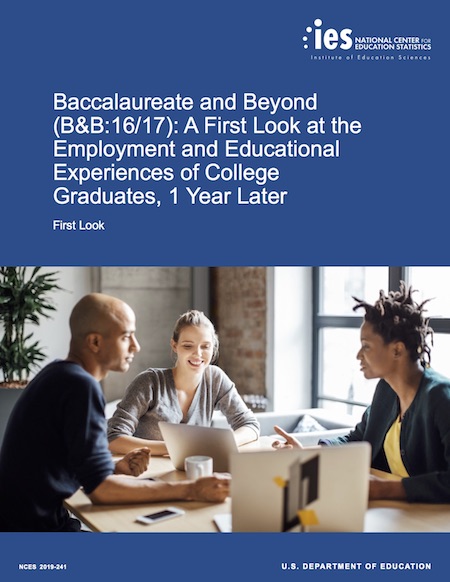 A new report from the U.S. Department of Education has been released on students who graduated from college during the 2015-16 academic year. The report shows employment status, debt level, graduate enrollment status, and income level of students one year after leaving college. Some of the data is broken down by racial/ethnic group.
A new report from the U.S. Department of Education has been released on students who graduated from college during the 2015-16 academic year. The report shows employment status, debt level, graduate enrollment status, and income level of students one year after leaving college. Some of the data is broken down by racial/ethnic group.
African Americans made up 10.1 percent of all bachelor’s degree recipients in the 2015-16 academic year. It took these African American college graduates an average of 64 months to earn their bachelor’s degrees after first enrolling in college. For Whites, it took an average of 52 months – a full year less – to earn their degrees.
For African American college graduates, 85.9 percent had taken out loans to finance their college education. Only 66.8 percent of White college graduates had taken out loans to pay for college. The average student debt loan for African American college graduates was $36,900. The average debt load for White college graduate who had taken out loans was $30,500.
One year after earning their bachelor’s degrees, 26.6 percent of African Americans were enrolled in graduate education. For Whites who graduated from college in the 2015-16 academic year, 22.1 percent were enrolled in graduate school.
About 74 percent of all African Americans who graduated from college were employed one year later compared to nearly 83 percent of Whites. Some 13.6 percent of African Americans were both enrolled in graduate programs and were employed compared to 12.5 percent of Whites.
The median income of African American college graduates one year after earning their bachelor’s degree was $36,000. For Whites, the median income was $40,000. This income gap for recent college graduates is far narrower than the overall Black-White income gap. This shows the value of higher education in reducing income equality.
The full report, Baccalaureate and Beyond (B&B:16/17): A First Look at the Employment and Educational Experiences of College Graduates, 1 Year Later, may be downloaded by clicking here.











Regarding the line: “This shows the value of higher education in reducing income equality.” The starting salaries show that this may be true initially. But, this article does not present evidence that income inequality has been reduced afterwards or over time after the initial starting period.
It would be interesting to see the data normalized on a per-university basis. The disparity of median income by race among graduates from the same school is far more interesting than overall graduate statistics.
Analyzing income equality by an overall statistic is only one piece of a puzzle. To conclude there is a lack of equality that is driven by racial factors one would need to compare apples to apples – what degrees, what universities, what industries, what geographic markets? Is there salary inequality when comparing like for like?
I understand that this is not the full report, but a little more statistical info would be nice. I see the agenda here, but simply giving random probabilities with no frame of reference does not help anyone.